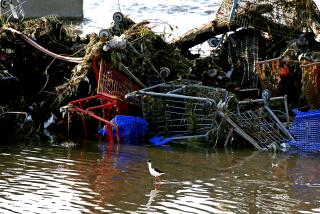Pollution Led to Fish Advisories in 48 States
- Share via
WASHINGTON — About one-third of the lakes and one-quarter of the rivers in the United States contain enough pollution that people should limit or avoid eating fish caught there, figures released Tuesday by the Environmental Protection Agency showed.
Every state but Alaska and Wyoming issued fish advisories covering some and occasionally all of their lakes or rivers in 2003, according to a database maintained by the EPA and updated every year.
Although the number of advisories rose from 2,814 in 2002 to 3,094, EPA Administrator Michael O. Leavitt attributed the increase to more monitoring, not more pollution.
Nearly all the advisories involved contaminants such as mercury, dioxins, PCBs, pesticides and heavy metals, including arsenic, copper and lead. Currently they cover 35% of the nation’s lake acreage and 24% of river miles.
Leavitt, relying on figures five years old, said mercury pollution from industry is decreasing.
Primary sources of mercury pollution include coal-burning power plants, the burning of hazardous and medical waste and the production of chlorine.
It also occurs naturally in the environment.
The advisories cover recreational and sport fishing, not deep-sea commercial fishing or fish farming operations.
Servings of fish caught by family or friends and not covered by an advisory should be limited to one 6-ounce portion a week, the Food and Drug Administration said.
The latest figures troubled the Sierra Club, the National Wildlife Federation and the Natural Resources Defense Council.
They want stricter limits on mercury pollution from coal-fired power plants.
“This listing clearly indicates that we are moving in the wrong direction on mercury pollution,” said Sen. James M. Jeffords (I-Vt.), a senior member of the Senate Environment and Public Works Committee.
More to Read
Sign up for Essential California
The most important California stories and recommendations in your inbox every morning.
You may occasionally receive promotional content from the Los Angeles Times.










